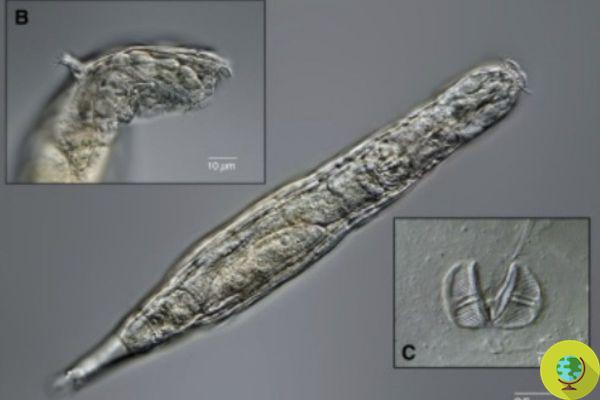
A microscopic invertebrate was discovered that was trapped, still alive, in the Arctic permafrost for 24.000 years and 'brought back to life'
A microscopic invertebrate was discovered that was trapped, still alive, in the Arctic permafrost for 24.000 years and 'brought back to life' by a team of Russian researchers.
The rotiferous bdelloid is such a small multicellular animal that you need a microscope to be able to see it. Despite its small size, however, it is known for its resistance to (almost) everything - from radiation to lack of oxygen, from freezing to drying. Now, a team of Russian researchers has observed not only that the bdelloid can survive freezing, but it can also remain 'hibernating' for thousands of years. In fact, specimens of this species have been found in the permafrost of Siberia, still alive. The researchers also identified unicellular microbes, as well as an ancient nematode worm (dating back to around 30.000 years ago).
Our study is the strongest evidence that multicellular animals can survive even tens of thousands of years in a state of completely stopped metabolism - he explains. It's Malavin, one of the researchers.
Until now it was estimated that rotifers could survive freezing for up to ten years. With this recent discovery, time has expanded incredibly: the researchers used radioactive carbon dating to determine the actual age of these animals and discovered that they were specimens dating back tens of thousands of years ago.
The point is that a multicellular organism can be frozen and stored for thousands of years, and then come back to life again - the dream of many science fiction writers. Obviously, the more complex the organism, the more insidious it is to keep it alive and, for mammals, this is currently not possible. Yet, already moving from a single-celled organism to an organism with a brain and digestive system (albeit microscopic) is already a significant step forward.
Scholars want to learn more about the biological mechanisms that allow these animals to survive. The hope is that this knowledge can then offer insights into how to cryopreserve the cells, tissues and organs of other animals - including humans.
Fonte: Current Biology
We also recommend:
- Water bears are truly indestructible (but the way it was discovered is terrifying)
- An old can of Coca-Cola and a pack of chewing gum from over 50 years ago found in Antarctica


























